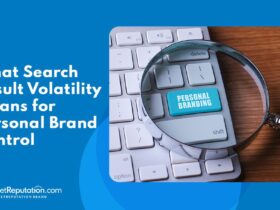In today’s digital world, trust scores are key to a business’s success. A high trust score boosts customer loyalty and keeps them coming back. On the other hand, a low score can scare off potential customers. So, it’s vital for businesses to keep an eye on their online reputation.
Studies like “The Four Factors of Trust” by Ashley and Amelia highlight trust’s role in strong customer bonds. By boosting your trust score, you can safeguard your online image. At ReputationReturn.com, we provide a free trust report to kickstart your journey.

Key Takeaways
- Trust scores significantly impact customer loyalty and business reputation.
- Monitoring and managing online reputation is crucial for business success.
- ReputationReturn.com offers a free trust report service to help businesses improve their trust scores.
- A high trust score can enhance customer retention and attract new clients.
- Understanding the factors that influence trust scores is essential for businesses.
The Rising Importance of Trust in Digital Business
In today’s digital world, trust is essential for businesses to succeed. As we explore the digital landscape, trust’s role in shaping customer views and business success is clear. It’s a key factor in the digital economy.
Current Trust Landscape in 2023
Today, consumers are more skeptical and watchful. A study shows that engaged employees lead to better results for both people and companies. This highlights trust’s role in customer and employee relationships. Businesses are focusing on trust to stay ahead.
How Consumer Behavior Has Shifted Post-Pandemic
The pandemic changed how people shop and interact online. Now, trust in digital businesses is more critical than ever. Consumers rely on online reviews and ratings to choose what to buy. Businesses are now focusing on building trust to stand out.
| Pre-Pandemic | Post-Pandemic |
|---|---|
| Offline transactions dominant | Online transactions surging |
| Trust built through personal interactions | Trust built through online reviews and ratings |
| Limited digital footprint | Expanded digital presence |
What Are Trust Scores and Why They're Making Headlines
In today’s digital world, trust scores are key for companies wanting to keep customer trust. They show how much people trust a brand. This is important for businesses to know.
Definition and Components
Trust scores come from different data, like customer reviews and social media. Harvard Business School professor Sandra Sucher says trust is crucial for loyalty. The main parts of trust scores are transparency, reliability, and customer satisfaction.
By looking at these, companies can see how they’re doing in the market.
Recent Developments in Trust Measurement
There have been big changes in how we measure trust. New tech and how people act online have led to these changes. Now, AI and machine learning help make trust scores more accurate.
Here are some important updates in trust measurement:
| Development | Description | Impact |
|---|---|---|
| AI-driven Analytics | Use of artificial intelligence to analyze consumer data and feedback. | Enhanced accuracy in trust scoring. |
| Social Media Monitoring | Continuous assessment of brand mentions and sentiment on social media platforms. | Real-time insights into brand reputation. |
| Customer Feedback Integration | Incorporation of customer reviews and feedback into trust score calculations. | More comprehensive trust assessments. |
Improving trust scores helps businesses grow. It makes customers more loyal and boosts sales. Trust scores are now a big deal in business.
The Critical Role of Brand Trust in Today's Market
In today’s market, brand trust is key to success. Consumers make choices based on how much they trust a brand. This trust is crucial.
Building trust is essential for business. Brands that earn customer trust see loyalty and more sales. This is a must for any company.
Trust as a Competitive Differentiator
Trust sets a brand apart in a crowded market. Brands that focus on trust stand out. This is especially true in markets where products are similar.
- Enhanced customer loyalty
- Positive customer reviews and ratings
- Increased customer retention rates
How Brand Trust Translates to Market Share
Brand trust and market share are linked. Consumers choose trusted brands. This leads to more market share and business growth.
Statistical Evidence from Recent Studies
Studies show trust’s impact on business. For example, high trust brands keep customers longer and grow revenue.
Industry-Specific Trust Patterns

By focusing on brand trust, businesses can build strong relationships. This leads to long-term success.
Breaking News: Latest Research on Trust Scores and Consumer Behavior
Recent studies have shown us a lot about trust scores and how they affect how people shop. It’s clear that knowing about trust scores is key for businesses wanting to keep their customers happy.
Key Findings from 2023 Consumer Trust Reports
The 2023 Consumer Trust Reports have brought to light some important trends. First, there’s a strong link between trust scores and customer loyalty. Businesses with high trust scores keep their customers longer.
Second, the reports say that being open and honest is crucial for trust. Companies that share their practices and policies win more customer trust.
How These Findings Are Changing Business Strategies
The insights from the 2023 reports are making businesses change their ways. They’re now working on boosting their trust scores by being more transparent and listening to customers. They’re also using more genuine marketing.
This change is not just for quick wins. It’s about creating lasting bonds with customers.
How Fortune 500 Companies Are Responding to Trust Metrics
Trust is now key to business success. Fortune 500 companies are changing their ways to boost their trust scores. They see brand trust as a vital asset in today’s market.
These companies are working hard to build and keep trust. For example, Salesforce has made trust a big part of its success story. It shows how trust can drive business forward (The Four Factors of Trust by Ashley and Amelia).
Case Studies: Trust-Driven Transformations
Many Fortune 500 companies are changing to improve their trust scores. They’re focusing on better customer service, being more open, and protecting data well.
A leading retail company is a great example. It updated its customer service to be more responsive and open. This move greatly boosted customer trust.
| Company | Trust-Driven Initiative | Outcome |
|---|---|---|
| Salesforce | Emphasized trust in business performance | Enhanced brand reputation |
| Retail Company | Overhauled customer service platform | Increased customer trust |
Executive Statements on Trust Initiatives
Executives from these companies talk about the value of trust. For instance, a Salesforce executive said trust is crucial for their strategy. It helps keep customers loyal and boosts sales.
These words show Fortune 500 companies’ dedication to brand trust. They know trust is key to their future success.
The Quantifiable Impact of Trust Scores on Revenue
For businesses looking to grow, knowing how trust scores affect revenue is key. Trust scores show how much customers trust a brand. They have a direct link to how much money a business makes.
High trust scores mean more people are likely to buy from you. This leads to more money coming in. It’s clear that trust scores play a big role in a company’s financial health.
Financial Analysis of High vs. Low Trust Brands
Studies show a big difference in money made between brands with high and low trust scores. Brands with high trust scores keep customers longer and spend less to get new ones. They also make more money.
For example, a study found that brands with high trust scores saw their revenue go up by 10%. This is compared to brands with lower trust scores.
Let’s look at a table that shows how high and low trust brands compare financially:
| Financial Metric | High Trust Brands | Low Trust Brands |
|---|---|---|
| Average Revenue Growth | 10% | 2% |
| Customer Acquisition Cost | $50 | $100 |
| Customer Retention Rate | 85% | 60% |
Conversion Rate Correlation with Trust Metrics
There’s a strong link between how much people trust a brand and how likely they are to buy. When people trust a brand, they’re more likely to make a purchase. This is because trust makes them feel more comfortable and secure.
“Trust is the glue that holds businesses and customers together. Without it, even the most innovative products or services can fail to gain traction.” –
E-commerce Trust Indicators
In e-commerce, things like secure payments and clear product info are key. Positive reviews also help build trust. Businesses that focus on these areas see better sales.
Service Industry Trust Benchmarks
In service industries, being quick to respond and transparent is important. Good customer service also matters. Brands that do well in these areas tend to have more loyal customers and make more money.
By focusing on these trust-building areas, businesses can boost their trust scores. This leads to more revenue and growth.
Introducing Rep Radar: ReputationReturn's Free Trust Assessment Tool
Rep Radar is changing how businesses check and boost their trust. In today’s market, knowing and managing trust is key to success. This tool helps businesses understand their trust levels, making it easier to grow.
Rep Radar gives a deep look at a company’s trust score. It shows strengths and weaknesses. This info helps businesses plan to improve their trust and stay competitive.
Features of the Comprehensive Reputation Report
The Rep Radar report dives deep into a company’s trust. It looks at customer happiness, loyalty, and advocacy. It also points out areas to work on. The report includes:
- Detailed analysis of customer feedback and sentiment
- Benchmarking against industry competitors
- Identification of areas for improvement
- Recommendations for trust-building strategies
Rep Radar helps businesses understand their trust better. They can make smart choices to grow and improve. For more on improving your online reputation, check out our related resource.
How Businesses Are Using Rep Radar to Gain Competitive Edge
Companies use Rep Radar to get ahead. They learn about their trust scores and find ways to improve. This helps them build a better reputation and attract more customers. Some ways businesses use Rep Radar include:
- Enhancing customer engagement and loyalty
- Improving their online reputation
- Staying ahead of industry competitors
Success Stories and Testimonials
Businesses that used Rep Radar saw big improvements. One company’s customer satisfaction went up by 25% after making changes based on Rep Radar. Learn more about Rep Radar and our reputation report at ReputationReturn.com.
Implementation Process and Timeline
Getting started with Rep Radar is easy and fast. Businesses get their detailed report in just a few days. Our team is here to help, making sure you get the most from Rep Radar.
The Technology Behind Modern Trust Scores
Digital landscapes are changing fast, and trust scores technology is at the forefront. We’re seeing a big change in how businesses measure and understand customer trust.
The core of modern trust scores is built on AI and machine learning. These tools help make trust assessments more accurate and detailed.
AI and Machine Learning Applications
AI and machine learning are changing how we measure trust. They look at huge amounts of data to find patterns that old methods might miss. Some key uses are:
- Predictive analytics to forecast customer behavior
- Sentiment analysis to gauge customer emotions
- Personalization algorithms to tailor customer experiences
Data Collection and Analysis Methods
Good trust scores need lots of data and smart analysis. We use many methods, like:
- Social media monitoring to capture customer sentiment
- Customer feedback surveys to gather direct insights
- Transaction data analysis to assess behavioral patterns
By using these technologies, businesses can understand their trust scores better. This helps them make smart choices to boost customer trust.
Actionable Strategies to Improve Your Brand Trust Score
As consumers get pickier, making your brand more trustworthy is crucial for success. To boost your brand trust, you need a plan that meets immediate needs, builds trust over time, and keeps it up with ongoing effort.
Let’s look at strategies for different timeframes to up your trust score.
Immediate Trust-Building Tactics
To quickly earn trust, try these:
- Be open about how your business works and what you say.
- Use strong security to keep customer data safe.
- Give clear, easy-to-understand info about what you offer.
Medium-term Trust Development
For lasting trust, focus on:
- Talk to your customers on social media and other platforms.
- Always deliver top-notch products or services.
- Show off what happy customers say about you.
Long-term Trust Sustainability
To keep trust going strong, remember to:
- Keep an eye on and adjust to what customers want and expect.
- Build a culture of trust in your company.
- Keep checking and tweaking your trust-building plans.
By using these tactics, you can make your brand more trustworthy and boost your trust score. For more tips on making a good impression, check out our guide on creating a positive brand impact.

Industry Experts Predict the Future of Trust Economy
Experts say the trust economy is about to change a lot. New ways to measure customer perception will shape the future. It’s key for businesses to keep up with these changes.
Trust scores are now vital for keeping customers loyal. With more online interactions, understanding what customers think is harder. It involves knowing both online and offline actions.
Emerging Trends in Customer Perception Measurement
How we measure customer perception is changing. There’s a focus on quick feedback and social media. New tech helps get a clearer picture of what customers feel. For example, AI tools can spot trends in huge amounts of data.
Some new trends include:
- Using AI and machine learning for feedback analysis
- Monitoring social media to see what customers think
- Doing surveys in real-time to catch immediate opinions
How to Stay Ahead of Trust Curve
To lead the trust curve, businesses need to act fast. They should use new tech and promote openness and responsibility. By focusing on trust, companies can strengthen their bonds with customers.
| Strategy | Description | Benefit |
|---|---|---|
| Proactive Trust Measurement | Regularly checking customer trust through different ways | Finding trust problems early |
| Transparency | Telling customers about how the business works | Building trust and credibility |
| Culture of Accountability | Creating a culture that values customer feedback | Higher customer happiness and loyalty |
Conclusion: The Undeniable Business Case for Prioritizing Trust Scores
Trust scores are key to business success. Brands that focus on trust see higher customer loyalty and more sales. In today’s world, how customers see you matters a lot. Trust is what can make or break your brand.
Knowing the value of trust scores can give your business an edge. Tools like Rep Radar help you stay ahead. Check out ReputationReturn’s free trust report service to learn more about protecting your online image.
At ReputationReturn, we help businesses succeed in a world where trust is everything. By focusing on trust scores and customer perception, you can grow your customer base and increase your success over time.
FAQ
What is a trust score, and why is it important for my business?
A trust score shows how much people trust your brand. It’s key because it affects how loyal customers are and how much money you make. ReputationReturn offers a free service to check your trust score and find ways to get better.
How do trust scores affect customer perception and loyalty?
Trust scores greatly influence how customers see and feel about your brand. A high score means customers trust you more, leading to more loyalty. But a low score can scare off potential customers and hurt your reputation.
What are the key components of a trust score, and how are they measured?
Trust scores are based on things like customer reviews and ratings. ReputationReturn’s Rep Radar tool uses smart algorithms to look at these factors. It gives you a detailed report on your trust score.
Can I improve my trust score, and if so, how?
Yes, you can boost your trust score by using strategies to build trust. ReputationReturn suggests quick actions like answering customer feedback. They also recommend improving customer service and creating a positive company culture over time.
How do Fortune 500 companies use trust metrics, and what can I learn from their approaches?
Fortune 500 companies use trust metrics to make better business choices and win customer trust. By looking at their trust-building efforts and what their leaders say, you can learn how to improve your own trust score.
Is ReputationReturn’s free trust report service available to all businesses?
Yes, ReputationReturn’s free trust report service is open to all businesses. It helps you understand your trust score and plan to make it better.
How does Rep Radar, ReputationReturn’s trust assessment tool, work?
Rep Radar uses AI and machine learning to analyze customer feedback. It gives you a detailed trust report. This report shows your strengths and weaknesses, helping you make informed decisions to boost your trust score.














